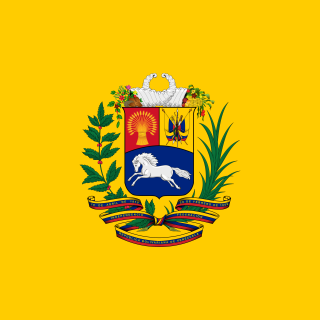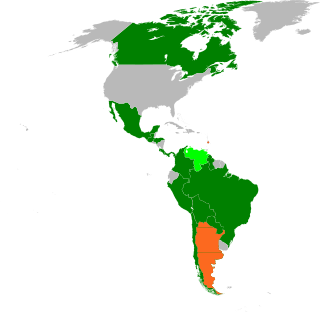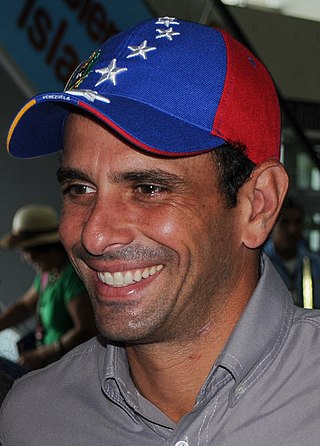
The Supreme Justice Tribunal is the highest court of law in the Bolivarian Republic of Venezuela and is the head of the judicial branch. As the independence of the Venezuelan judiciary under the regime of Nicolás Maduro is questioned, there have recently been many disputes as to whether this court is legitimate.

Elections in Venezuela are held at a national level for the President of Venezuela as head of state and head of government, and for a unicameral legislature. The President of Venezuela is elected for a six-year term by direct election plurality voting, and is eligible for re-election. The National Assembly (Asamblea Nacional) has 165 members (diputados), elected for five-year terms using a mixed-member majoritarian representation system. Elections also take place at state level and local level.

The Constitution of the Bolivarian Republic of Venezuela is the current and twenty-sixth constitution of Venezuela. It was drafted in mid-1999 by a constituent assembly that had been created by popular referendum. Adopted in December 1999, it replaced the 1961 Constitution, the longest-serving in Venezuelan history. It was primarily promoted by then President of Venezuela Hugo Chávez and thereafter received strong backing from diverse sectors, including figures involved in promulgating the 1961 constitution such as Luis Miquilena and Carlos Andrés Pérez. Chávez and his followers (chavistas) refer to the 1999 document as the "Constitución Bolivariana" because they assert that it is ideologically descended from the thinking and political philosophy of Simón Bolívar and Bolivarianism. Since the creation of the Constituent National Assembly in August 2017, the Bolivarian government has declared the 1999 constitution suspended until a new constitution is created.

Presidential elections were held in Venezuela on 3 December 2006 to elect a president for a six-year term to begin on 10 January 2007. The contest was primarily between incumbent President Hugo Chávez, and Zulia Governor Manuel Rosales of the opposition party A New Era.

The president of Venezuela, officially known as the President of the Bolivarian Republic of Venezuela, is the head of state and head of government in Venezuela. The president leads the National Executive of the Venezuelan government and is the commander-in-chief of the National Bolivarian Armed Forces. Presidential terms were set at six years with the adoption of the 1999 Constitution of Venezuela, and presidential term limits were removed in 2009.

Jorge Jesús Rodríguez Gómez is a Venezuelan politician and psychiatrist serving as President of the National Assembly of Venezuela since 2021. He previously served as the vice president of Venezuela from 2007 to 2008 and as Mayor of the Libertador Bolivarian Municipality from 2009 to 2017. He is the brother of Delcy Rodríguez, the current vice president.

Presidential elections were held in Venezuela on 14 April 2013 following the death of President Hugo Chávez on 5 March 2013. Nicolás Maduro—who had assumed the role of acting president since Chávez's death—was declared winner with a narrow victory over his opponent Henrique Capriles, the Governor of Miranda. Capriles had run in the previous election less than a year before, losing to Chávez by an 11-point margin. This time the margin of victory was much smaller, and thus became the closest presidential election of the country since the 1968 election.

2016 protests in Venezuela began in early January following controversy surrounding the 2015 Venezuelan parliamentary elections and the increasing hardships felt by Venezuelans. The series of protests originally began in February 2014 when hundreds of thousands of Venezuelans protested due to high levels of criminal violence, inflation, and chronic scarcity of basic goods because of policies created by the Venezuelan government though the size of protests had decreased since 2014.

On 14 April 2013 Nicolás Maduro was elected President of Venezuela, narrowly defeating opposition candidate Henrique Capriles with just 1.5% of the vote separating the two candidates. Capriles immediately demanded a recount, refusing to recognize the outcome as valid. Maduro was later formally inaugurated as President on 19 April, after the election commission had promised a full audit of the election results. On 24 October 2013, he announced the creation of a new agency, the Vice Ministry of Supreme Happiness, to coordinate all the social programmes.

Presidential elections were held in Venezuela on 20 May 2018, with incumbent Nicolás Maduro being declared re-elected for a second six-year term. The original electoral date was scheduled for December 2018 but was subsequently pulled ahead to 22 April before being pushed back to 20 May. Some analysts described the poll as a sham election, as many prominent opposition parties had been barred from participating in it. The elections had the lowest voter turnout in Venezuela's democratic era.

The 2017 Venezuelan protests began in late January following the abandonment of Vatican-backed dialogue between the Bolivarian government and the opposition. The series of protests originally began in February 2014 when hundreds of thousands of Venezuelans protested due to high levels of criminal violence, inflation, and chronic scarcity of basic goods because of policies created by the Venezuelan government though the size of protests had decreased since 2014. Following the 2017 Venezuelan constitutional crisis, protests began to increase greatly throughout Venezuela.

On 29 March 2017, the Supreme Tribunal of Justice (TSJ) of Venezuela took over legislative powers of the National Assembly. The Tribunal, mainly supporters of President Nicolás Maduro, also restricted the immunity granted to the Assembly's members, who mostly belonged to the opposition.

Constituent Assembly elections were held in Venezuela on 30 July 2017 to elect the members of the 2017 Constituent National Assembly. Unlike the 1999 Constituent National Assembly, which was assembled following a referendum, the 2017 election was convened by the presidential decree of President Nicolás Maduro. Smartmatic, the Venezuelan-owned company which provided the voting machines, stated that the results were tampered with by the CNE, and that the turnout was off by at least one million votes.

The Lima Group is a multilateral body that was established following the Lima Declaration on 8 August 2017 in the Peruvian capital of Lima, where representatives of 12 countries met in order to establish a peaceful exit to the ongoing crisis in Venezuela.
Parliamentary elections were held in Venezuela on 6 December 2020. Aside from the 167 deputies of the National Assembly who are eligible to be re-elected, the new National Electoral Council president announced that the assembly would increase by 110 seats, for a total of 277 deputies to be elected.
The Supreme Tribunal of Justice of Venezuela (TSJ) in exile is an institution that some, including the Organization of American States, consider to be the legitimate highest court of law in Venezuela and the head of the judicial branch, as opposed to the Supreme Tribunal of Justice. It was established on 21 July 2017 following the 2017 Venezuelan constitutional crisis. The TSJ's 33 members have been based in Chile, Colombia, Panama, and the United States due to the political crisis in Venezuela.
Nicolás Maduro, incumbent President of Venezuela since 2013 and successor of Hugo Chávez, was officially nominated for re-election as the presidential candidate of the Great Patriotic Pole (GPP) on 4 February 2018.
The Statute Governing the Transition to Democracy to Re-establish the Validity of the Constitution of the Bolivarian Republic of Venezuela is a statute adopted by the Venezuelan National Assembly that defines the "duration of a transition government and its political and economic responsibilities". Approved on 5 February 2019, through its seven chapters and thirty-nine articles, the Transition Statute "governs the installation of a provisional Government and the convocation of free elections", and "establishes the election of new rectors of the National Electoral Council, new magistrates of the Supreme Tribunal of Justice and new representatives of the Citizen Power." It also establishes that – in the absence of a constitutionally elected president – the National Assembly President is the Acting President of Venezuela.

Regional and municipal elections were held in Venezuela on 21 November 2021. In the elections, all executive and legislative positions of the 23 federal entities, as well as that of the 335 municipalities of the country, were renewed.

Venezuelan opposition to the Chavista governments of former President Hugo Chávez and current President Nicolás Maduro, commonly referred to as the Venezuelan opposition, or sometimes, anti-Chavismo, is a political umbrella term used to describe political, social and religious movements that have opposed Chavismo, and the associated Bolivarian Revolution political process since 2 February 1999.













